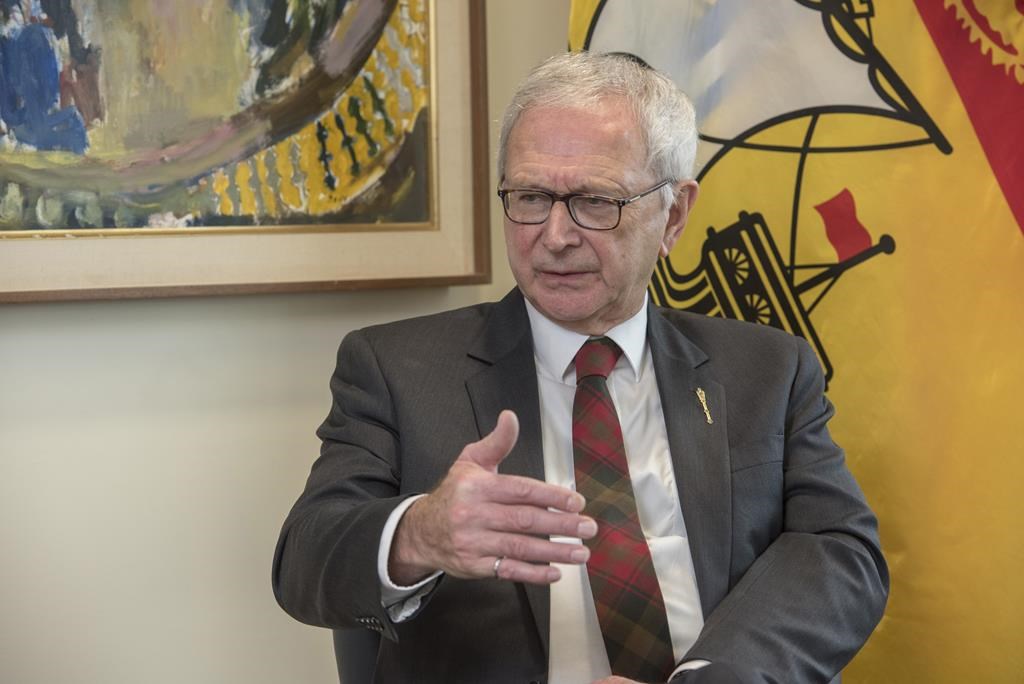N.B. gender policy in schools: Premier won’t back down, says it’s an election winner

Posted Dec 28, 2023 05:00:00 AM.
Last Updated Dec 28, 2023 05:01:28 AM.
FREDERICTON — As he looks ahead to an election year, New Brunswick Premier Blaine Higgs says he has no intention of backing down on his government’s changes to the province’s policy on gender identity in schools.
In fact, he seems to be pushing the topic harder as he vies for a third term in office.
For Higgs, parental rights are “very important.” Those rights, he said, are reflected in his government’s changes to Policy 713, which require parents’ consent before teachers can use the preferred name or pronouns for transgender or nonbinary students under 16. That policy has been copied by Saskatchewan, but has also led to serious dissent within Higgs’s governing party, a lawsuit, and strong criticism across the country.
In an end-of-year interview with The Canadian Press, Higgs said he expects the issue to figure prominently in his Progressive Conservative party’s upcoming campaign for the election, scheduled for Oct. 21, 2024.
“I’ve always felt parents should play the main role in raising children,” he said. “No one is denying, you know, gender diversity is real. But we need to figure out how to manage it.”
It was “shocking,” he said, that the original policy allowed teachers to keep parents in the dark about whether their child was questioning their gender identity.
But it was Higgs’s own education minister at the time, Dominic Cardy, who implemented the policy in August 2020, which required teachers to respect the preferred name or pronouns of students. The new rules requiring parents’ consent came into effect in July.
The premier said he hadn’t paid close attention to the wording of the policy until this year. “I forget how it came to my attention originally, that we actually had a clause about … not telling parents. So I said, ‘that can’t be true. We can’t have a policy that says that.'”
Without providing evidence to back up his claim, Higgs said, “about 60 per cent” of young children who are questioning their gender identity “are given automatic affirmation and put on some sort of hormone therapy” after their first medical appointment.
Rebecca Bromwich, an adjunct professor at Carleton University’s department of law and legal studies, said she doesn’t know where Higgs came up with that number because medical records are confidential.
“I question his source for that,” she said.
“I think that sounds like an ideological claim as opposed to one that’s grounded in any evidence. And if you can show me the evidence for that, I will believe.”
The concept of “parental rights,” Bromwich said, is not found in Canadian law. Child protection legislation and the federal Divorce Act, she explained, protect the best interests of children.
“Under Canadian law … we don’t actually have a concept of parental rights. Parental rights implies property and children. Children are not property.”
She said his stance on parental rights could be seen as a way for Higgs to solidify support among anti-LGBTQ members of his base: “It’s a dog whistle.”
A fundraising letter from Higgs’s party earlier this month asks members to sign a “pledge in support of parental rights,” and/or make a donation anywhere between $25 to $3,000, or “my best gift” toward the issue as they go into the new year.
Not all members of the party have been on board with the government’s position on children and gender identity. The changes to Policy 713 sparked a revolt among members of the legislative assembly: eight members of the Tory caucus sat out question period in June in protest, and six members of his government voted with the Opposition to force a motion through the legislature asking the province’s child and youth advocate to review the changes. Two ministers resigned, and in response, Higgs shuffled his cabinet to remove dissenters who hadn’t quit.
But the New Brunswick Tories have welcomed at least one more proponent of “parental rights” ahead of the 2024 election campaign.
Last week, activist and Christian TV host Faytene Grasseschi was acclaimed as the candidate in Hampton-Fundy-St. Martins, a riding adjacent to the premier’s. Grasseschi had campaigned for the nomination by championing Policy 713.
Higgs said her nomination was exciting, adding that she was able to bring in “a lot of new members to the party.”
People are attracted to Grasseschi’s dedication, work ethic and ability to “demonstrate her convictions,” he said.
Grasseschi is also the author of several books, including “Marked,” published in 2009 under her maiden name Kryskow. In it she writes about God speaking to her, and describes her activism as preparing a throne for Christ. “I am working to build a throne for Jesus in my city,” she wrote. “I love it.”
Higgs said he is not concerned that Grasseschi’s beliefs might drive socially progressive people away from the party.
“We have a very diverse population, and it’s becoming more diverse all the time,” he said. “And we have to respect everyone’s individual rights and freedoms and beliefs.”
This report by The Canadian Press was first published Dec. 28, 2023.
Hina Alam, The Canadian Press








